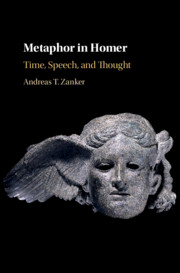Book contents
- Metaphor in Homer
- Metaphor in Homer
- Copyright page
- Contents
- Figures
- Preface
- Note on Texts and Translations
- Abbreviations
- Introduction
- Chapter 1 Ancient and Modern Views on Metaphor in Homer
- Chapter 2 Conceptual Metaphors for Time in Homer
- Chapter 3 Conceptual Metaphors for Speech in Homer
- Chapter 4 Conceptual Metaphors for Mind, Intention, and Self in Homer
- Conclusion
- Book part
- Bibliography
- General Index
- Index Verborum
- Index Locorum
Chapter 2 - Conceptual Metaphors for Time in Homer
Published online by Cambridge University Press: 29 July 2019
- Metaphor in Homer
- Metaphor in Homer
- Copyright page
- Contents
- Figures
- Preface
- Note on Texts and Translations
- Abbreviations
- Introduction
- Chapter 1 Ancient and Modern Views on Metaphor in Homer
- Chapter 2 Conceptual Metaphors for Time in Homer
- Chapter 3 Conceptual Metaphors for Speech in Homer
- Chapter 4 Conceptual Metaphors for Mind, Intention, and Self in Homer
- Conclusion
- Book part
- Bibliography
- General Index
- Index Verborum
- Index Locorum
Summary
In this chapter, the author goes through the different ways in which spatial terminology is mapped onto the abstract phenomenon of time, discussing the role of the grammatical cases and the use of prepositions as well as the more ornate descriptions. The author first discusses the moving ego metaphor ("we're approaching Christmas"), before discussing the metaphor whereby time approaches the ego ("Christmas is coming"), and that whereby time is figured simply as a sequence without an ego ("Christmas is before Easter"). He then discusses the question of whether the Greeks envisioned the future as "behind" them (and argues that they did not), before considering further metaphors for time.
- Type
- Chapter
- Information
- Metaphor in HomerTime, Speech, and Thought, pp. 61 - 102Publisher: Cambridge University PressPrint publication year: 2019

